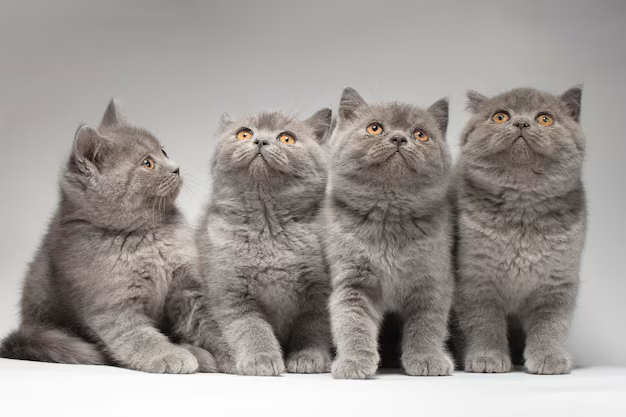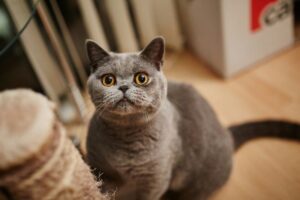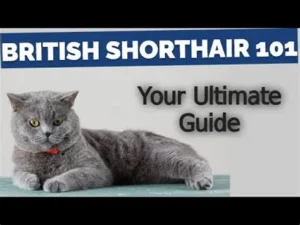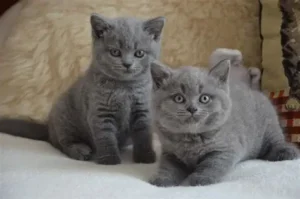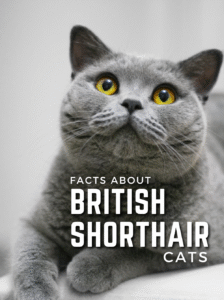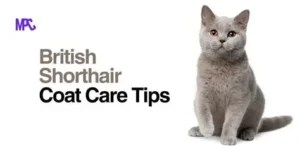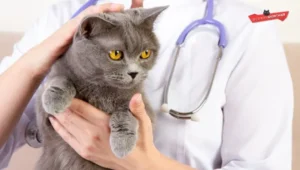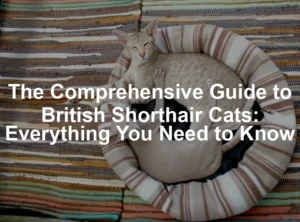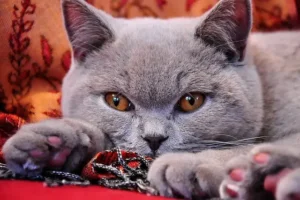Are British Shorthair Cats Good with Children?
British Shorthair cat behavior of the most appealing qualities of British Shorthairs is their gentle and patient nature, which makes them excellent companions for families with children. These cats are typically calm and tolerant, making them less likely to become agitated in a bustling household.
Here’s why British Shorthairs are good with kids:
- Calm Demeanor: British Shorthairs are generally easygoing and don’t easily get upset by loud noises or sudden movements.
- Patience: They tend to be patient with children, tolerating gentle handling and even occasional rough petting. However, it’s important to teach children how to interact with cats properly to avoid overstimulation.
- Not Easily Agitated: Unlike some breeds that are more sensitive or excitable, British Shorthairs are less likely to scratch or bite when they’re bothered, as long as they have their space and time to relax.
For the best experience, supervise interactions between young children and the cat to ensure that both are comfortable.
How Do British Shorthair Cats React to Strangers?
British Shorthairs are typically reserved and cautious around strangers. While they are not overly aggressive, they prefer to observe new people from a distance rather than rushing to greet them. This is part of their independent nature.
- Slow to Warm Up: British Shorthairs will often take their time to warm up to new people, preferring a slow introduction. They may avoid direct interaction at first but will eventually come around if they feel comfortable.
- Not Overly Affectionate with Strangers: Unlike some breeds that may jump into your lap immediately, British Shorthairs are more likely to maintain a respectful distance until they feel safe and secure.
- Tend to Stay Calm: Even when encountering new people, British Shorthairs remain calm and composed. They are unlikely to show anxiety or aggression.
If you are introducing your British Shorthair to guests, allow them time and space to adjust at their own pace.
Why Is My British Shorthair Cat So Aloof?
If you’ve noticed that your British Shorthair seems aloof or distant at times, rest assured this is often simply a reflection of their naturally independent temperament. Unlike some cats that crave constant attention, British Shorthairs are more self-sufficient and enjoy spending time on their own. British Shorthair cat personality traits
- Personal Space: British Shorthairs value their personal space and will often retreat to a quiet spot where they can rest without being disturbed. They may seem aloof if they are simply enjoying some alone time.
- Independent Nature: While they can be affectionate, they tend to show love in their own way. They may sit near you or follow you around the house without being overly demanding.
- Mature Behavior: British Shorthairs are often less playful and calmer and more composed, which can sometimes come off as aloofness. However, they still enjoy companionship, just on their terms. British Shorthair cat behavior
If your British Shorthair is aloof, it’s likely a reflection of their calm, independent nature, and not an indication of any behavioral problem.
Do British Shorthair Cats Meow Often?
British Shorthairs are quiet cats and don’t meow excessively, making them a great choice for people who prefer a quieter feline companion. Their meowing is generally reserved for specific needs, such as:
- When Hungry: Like most cats, British Shorthairs may meow when they’re hungry or want to be fed. However, they are less vocal than some other breeds when it comes to demanding attention.
- Seeking Attention: Although not particularly vocal, British Shorthairs may give a soft meow when they want affection or attention, especially if they are seeking a cuddle or play session. British Shorthair cat behavior
- Curiosity or Play: A British Shorthair may occasionally vocalize when they’re feeling playful or curious about something, but these meows are typically gentle and not constant. British Shorthair cat behavior
If you’re looking for a cat that isn’t overly vocal, a British Shorthair is an ideal choice.
What Are British Shorthair Kittens Like to Train?
British Shorthair cat temperament is intelligent and easy to train, though they tend to have a calm and relaxed attitude, which means they might not be as energetic in training sessions as more hyperactive breeds. Here’s what you can expect when training a British Shorthair behavior traits:
- Quick Learners: British Shorthairs are highly trainable and can learn basic commands such as “sit,” “stay,” or “come” quite quickly. Start training early with positive reinforcement like treats and praise.
- Loyalty to Routine: British Shorthairs thrive on routine and will often pick up new habits or tricks if they are practiced regularly at set times. They enjoy the consistency of knowing what’s expected.
- Playful Training: Since British Shorthair kittens have a playful side, incorporate toys or treats into training sessions to keep them engaged and motivated. However, don’t push them too hard—they will take breaks when they need them.
- Litter Training: British Shorthair kittens are usually quick to litter train, as they tend to be clean and meticulous about their environment.
Are British Shorthair Cats Affectionate or Independent?
British Shorthair personality is often described as a balance between affectionate and independent. While they are not as clingy as some other breeds, they enjoy being around their owners and are loyal companions.
- Affectionate on Their Terms: British Shorthairs are affectionate but in a low-maintenance way. They may enjoy curling up on your lap or sitting beside you, but they are not overly demanding of attention.
- Independent Nature: They enjoy their alone time and may spend long hours resting quietly by themselves, showing their independent streak. However, they still seek companionship when they want it.
- Form Strong Bonds: British Shorthairs tend to form strong bonds with their owners. They may not be the type to greet you at the door, but they will seek your presence and show affection through gentle purring and companionship.
How to Stop a British Shorthair from Scratching Furniture?
British Shorthair temperament an instinctive need to scratch to mark territory, sharpen claws, and stretch their muscles. However, there are steps you can take to redirect this behavior and prevent damage to your furniture:
- Provide Scratching Posts: Invest in high-quality scratching posts or pads, and place them near areas where your British Shorthair enjoys scratching. Cats tend to scratch in places where they feel comfortable, so make sure the posts are in prominent spots.
- Use Deterrents: Apply safe, cat-friendly deterrent sprays to your furniture or use double-sided tape on areas where your cat tends to scratch. The sticky sensation can discourage scratching.
- Regular Nail Trimming: Keep your British Shorthair’s claws trimmed regularly to reduce the damage caused by scratching. Be sure to use proper cat nail clippers to avoid injury.
- Training: Gently redirect your cat’s scratching from furniture to the scratching post by offering positive reinforcement when they use it. You can also use toys to entice them to scratch in the right areas.
SEO Entity & Keyword Mapping for gatobritánicofarm.com
GEO (Geographical) Keywords:
- British Shorthair temperament in [City/Region]
- British Shorthair behavior training in [Location]
- Best vet for British Shorthairs in [City]
- British Shorthair breeders near [Location]
- Cat behavior consultations in [Region]
AEO (Audience-Specific) Keywords:
- How to train a British Shorthair kitten
- Why is my British Shorthair so aloof?
- How to stop your British Shorthair from scratching furniture
- British Shorthair behavior issues and solutions
- Best toys for British Shorthairs to prevent scratching
NLP (Natural Language Processing) Keywords:
- Are British Shorthair cats good with children?
- How do British Shorthair cats behave with strangers?
- How to deal with a British Shorthair’s aloofness
- Why does my British Shorthair not meow often?
- What are the personality traits of British Shorthair kittens?
